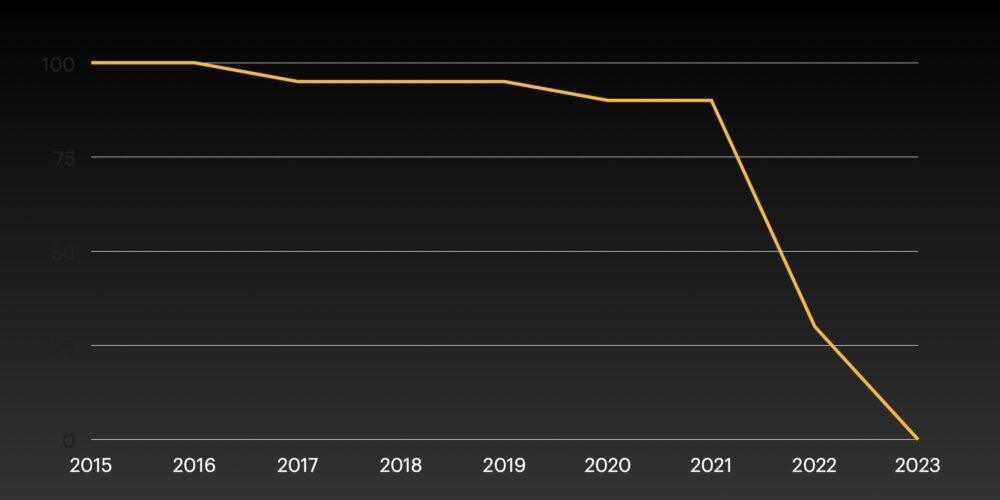Most human failures follow this predictable trajectory

In Ernest Hemingway’s famous novel, The Sun Also Rises, a character is asked how he went bankrupt. “In two ways,” he answers. “Gradually and then suddenly.”
A famous sentence, one that aptly describes how businesses go down. We get fixated on the sudden events that occur at the end of the trajectory—banks calling in their loans, creditors going to court, unpaid salaries, and the like. It all feels dramatic and sudden, and we look for answers in the here and now.
But those answers can only be found way back.
As I wrote in my book The Bigger Deal, business death is more often a case of suicide than homicide. Most businesses that die are not killed suddenly; they kill themselves—gradually, then suddenly. It is many years of neglect that explain the sudden ending.
Businesses die for a wide range of reasons. They fail to stay relevant to their customers. They indulge in various bad practices. They have weak governance and controls. They fall back in the race with competitors. They are unable to address disharmony in their key people. They borrow heavily on waves of unfounded optimism.
None of those pathogens arrive suddenly. They take time to manifest, weakening the organization slowly but surely. And so a failing business can look like it’s succeeding for quite a while before it finally goes bust. The drama catches everyone’s attention, but what should have been attended to happened slowly, over many years. As strategy guru Gary Hamel once put it: “A turnaround is a transformation tragically delayed.”
Businesses are not the only things that go wrong following this gradually-then-suddenly trajectory. Many other human endeavours follow the same path. There is much anxiety and hand-wringing when we suffer an avoidable medical event, for example, but our lifestyle choices over many years prior often go unremarked.
When human constructs like bridges or dams fail, or cities are flooded, it is not just because of sudden and unusual rain events. There is a gradual negligence afoot—years and years of wear and tear, maintenance failures, or unattended corrosion. Because we looked away from that work, we are forced to look on in horror when the final collapse happens.
What about the economic collapse of a whole country? There is a sudden set of events at the end of the trajectory: spiking interest rates and inflation; plunging currencies and spending; inability to meet regular commitments. We usually look for events in the world at the time to explain those currently red indicators; yet the true culprits are often hidden in our own pasts. Economic mismanagement takes years to manifest, and economies can boom superficially while hiding the growing weakness beneath the froth. Unrestrained borrowing combined with unproductive spending is the usual cause, aided and abetted by corrupt diversion of funds. Entire nations can find themselves held hostage by their creditors and lenders and end up having to take very bitter economic medicine. All because of bad policies and priorities, gradually inflicted.
Even at the level of the planet, we now face a plethora of extreme weather events. This is not because of our recent failures in protecting mother Earth, but because of decades of pursuing narrow and short-term gain at the expense of our natural environment. We polluted and exploited and extracted at will, gradually and wilfully. Now it is time for the consequences, which may well be sudden.
Our relationships, too, follow this pattern. There is much sensation when a relationship begins and particularly if it ends, because it spills out into the open and becomes visible to all. The last events in the relationship—the schisms and separations—become the news. Yet the real news was happening earlier, in small daily occurrences—unresolved conflicts, growing resentments, perceived slights.
Gradually, then suddenly, is a common feature of human failures. We neglect for long periods, then wail in anguish when the inevitable happens. The real lesson is about timeliness: the need to be always alert and proactive in whatever we do. We must treat our manifold ailments, medical or otherwise, long before their symptoms are self-evident.
What would that look like? Constant vigilance, to track symptoms before they are serious; regular corrective actions, even if minor in themselves; and most importantly, a long-term perspective that makes us act not just for ourselves in the moment, but for the collective, and for posterity. This is easier said then done, of course; even the best of us are often guilty of letting problems build up. Yet we must all be aware of the danger. I often advise leaders I work with to meditate deeply on this sentence: the greater good, for the longer term. That is where true achievement sits. Acting narrowly and momentarily is the short-lived pastime of the mediocre.
We can all act in a flurry of panicked activity once the problem is smacking us in the face; but the truly wise don’t let the problem build up in the first place. They act resolutely long before the need to act is apparent. They fix things before they are broken. As the saying goes, the time to repair a roof is before it starts raining.
(Sunday Nation, 21 May 2023)

Buy Sunny Bindra's new book
The X in CX
here »
Popular Posts
- NY’s wake-up call to the old guardNovember 9, 2025
- Save your strength for repairsNovember 2, 2025
- How to listen, really listenNovember 16, 2025
- Empathy is the missing code in CXOctober 26, 2025
- Is AI hiring your company into oblivion?November 23, 2025















